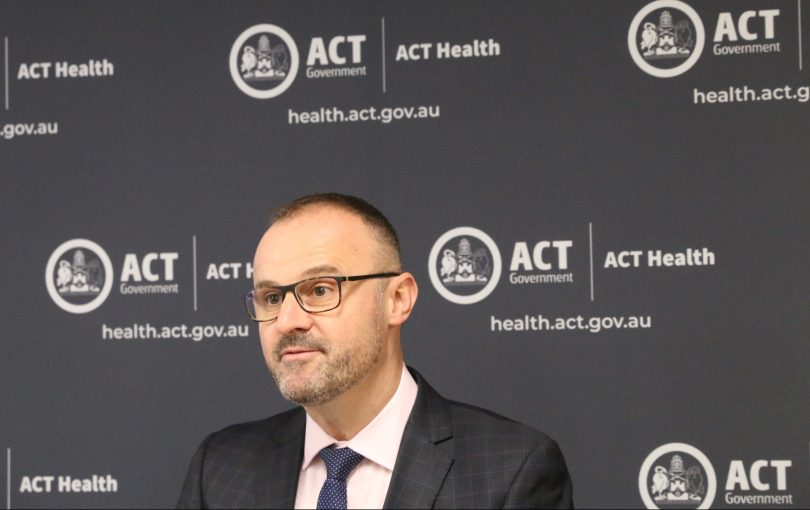
Chief Minister Andrew Barr: ”We must save as many local jobs as possible.” Photo: Dominic Giannini.
The ACT Government’s $137 million coronavirus stimulus package announced today includes rebates on residential rates to help ease cashflow pressures for Canberra households, and a freeze on a number of government fees and charges.
ACT Chief Minister Andrew Barr said the economic survival package was the first phase in the Government’s plan to protect as many jobs as possible and support Canberra households and businesses.
The Government will freeze the fire and emergency services levy, public transport, vehicle registration and parking fees, and introduce a number of measures to support small to medium businesses as they adjust to social distancing requirements and an expected downturn in the local economy.
All residential ratepayers, 168,000 households, will receive a $150 rebate on the fixed charge component of their 2020-21 rates, while 6000 businesses will have their annual fixed charge of $2622 accredited automatically, for properties with an AUV below $2 million.
The rates package amounts to $41.7 million.
People who receive the utilities concession, about 35,000 households, will have $200 applied to their electricity bill, while small businesses that use 100 megawatts a year will have $750 automatically applied to their accounts.
Public housing tenants, about 12,000 households will receive $250 to complement the $150 Commonwealth payment.
There will be a six-month waiver of payroll tax from 1 April for businesses in the most-affected sectors such as tourism, hospitality and entertainment.
Medium-sized businesses with payrolls up to $10 million will be able to defer their 2020-21 payroll tax liability, interest free, until 1 July 2022. Businesses with payrolls under $2 million don’t pay payroll tax.
The government will accelerate payment of invoices for local enterprises to increase cash flow.
The government is waiving all food business registration, liquor licensing and outdoor dining fees for 12 months from April.
Taxi and ride-share fees will also be waived.
There will be a $20 million fund to boost screwdriver-ready minor capital works projects that don’t need procurement processes, and $3 million to fast track urban forest and public realm maintenance.
Casual and gig economy workers will also receive support, as well as clubs and the VET sector.
“We will provide an additional payment of $1.5 million, as well as freeing up the existing $1.8 million in the Clubs Diversification Fund to support our clubs to keep staff employed on the clubs’ award rate,” Mr Barr said.
Subsidies for apprenticeships, traineeships, and other VET students will be increased through a $2 million injection into the sector.
The community sector will benefit from $7 million package to meet increased demand for emergency relief.
Lifeline ACT with get an additional $100,000 to bolster its support services following a recent spike in calls.
The government will also bring forward $500,000 in arts grants to keep local arts groups going.
ACT Government agencies have been instructed to prioritise the processing of development applications, with 10 more staff for the DA assessment team in addition to the new front line staff announced in the 2019-20 Budget.
Mr Barr said the government would use existing payment systems so people did not have to contact the government.
“I wanted to be able to deliver the benefits quickly,” he told ABC radio this morning.
The government will also boost resources to support public health services to continue providing essential health services to the community and to respond to the additional demands of the COVID-19 pandemic.
This includes funding for respiratory assessment clinics and to increase inpatient beds and ICU capacity across the Territory, maintain COVID-19 testing capacity and purchase additional medical equipment and supplies.
The stimulus package is likely to be the first of four initiatives to support the ACT economy.
“In the first phase of our response, the ACT Government will implement a range of measures to reduce cashflow pressures in the short term for low-income households and local small and medium businesses in the industry sectors that are most impacted,” Mr Barr said.
“We must save as many local jobs as possible as our economy adjusts to the difficult decisions being made at the national level to flatten the transmission curve and support our healthcare system.”
Mr Barr said the economic impacts of the virus would be felt for years, and required a phased response both before, during and after the anticipated peak in COVID-19 cases across Australia.
“We will announce further packages as we transition through the different phases of this crisis,” he said.
Original Article published by Ian Bushnell on The RiotACT.


What's Your Opinion?